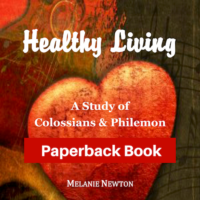Defeat the Victim Infection

AI was not used to generate this post.
Has someone wronged you? What would it take to bring about reconciliation? How hard would it be to forgive them? Or did you succumb to the Victim infection, where you cannot stop pointing the finger with blame? This is post #13 in our Healthy Living series from Colossians and Philemon. In this article, we will see that a study of Philemon will show you how to defeat the Victim infection and stay spiritually healthy in an unhealthy world.
Key Takeaways
- The article explores how to defeat the victim infection through reconciliation and forgiveness.
- Paul’s situation with Onesimus illustrates the struggle between victim mentality and seeking forgiveness.
- When we view ourselves as victims, we undermine Christ’s sovereignty in our lives.
- Jesus Christ renews our hearts, enabling us to forgive and heal relationships.
- Being a grace-giver helps build community and ultimately defeats the victim infection.
Listen to this post as a similar podcast from our Healthy Living Bible Study of Colossians and Philemon:
Think about a time when someone wronged you. How long did you stay wounded? What did it take (or would it take) to bring about reconciliation? How hard was it to forgive that person? Or did you succumb to the Victim infection, where you just cannot stop pointing the finger with blame?
A situation that could incubate the victim infection
Therefore, although in Christ I could be bold and order you to do what you ought to do, yet I prefer to appeal to you on the basis of love. It is as none other than Paul—an old man and now also a prisoner of Christ Jesus— that I appeal to you for my son Onesimus, who became my son while I was in chains. Formerly he was useless to you, but now he has become useful both to you and to me. … So if you consider me a partner, welcome him as you would welcome me.If he has done you any wrong or owes you anything, charge it to me. (Philemon 8-11, 17-18)
As Paul looked across the room of his Roman prison at the young man, Onesimus, he knew he had a situation on his hands that could either incubate the victim infection or defeat it. The young slave, now so dear to Paul, had apparently stolen some money from his master and run away. Being led by the Spirit to Paul, the runaway slave heard the gospel and trusted Christ to take away his sins. Paul became his spiritual father, teaching him and loving him as a son.
As much as Paul wanted this young man to stay near him, he knew that Onesimus should return to Philemon, who was his owner. He needed to seek forgiveness for stealing the money and for running away. It was common for a large Roman household to have slaves. Any slave who ran away could be killed. Paul certainly did not want that to happen to his son Onesimus. That means he had to put Onesimus’ safety in the hands of Jesus.
We don’t know if Paul ever met Philemon though Paul seemed to know enough about him to appreciate him as a Christian brother and a leader of a house church. Now, Philemon the slave owner and Onesimus the runaway slave were Christian brothers. Paul sent Onesimus back to Philemon. It was the right thing to do. When they met, would there be finger-pointing as each one considered themselves a victim? One could be blamed for being a slave owner. The other could be blamed for being a thief. Would the Victim infection overrule the teaching of Christ to forgive and reconcile?
The victim infection like several others we have discussed in this Healthy Living series of articles puts self over Christ.
The victim infection puts self over Christ.
When you continually see yourself as a victim of other people’s actions or what you think are unfair situations, then you are basically taking over the sovereignty of your life from Jesus Christ as your Lord.
You recognize the victim infection by your thinking pattern. It is “your” right—not a privilege God has allowed you to have and enjoy. It is “your” stuff—not material provisions God has given you the ability to acquire. You as the “victim” see only what is in front of your face—not the eternal value. Symptoms of this infection are anger, despair, and self-pity.
Think of Joseph in the Bible. He was certainly mistreated by his brothers. Years of family life were taken away from him. But in Genesis chapter 50, when Joseph was standing in front of those guilty brothers, he told them this,
Don’t be afraid. Am I in the place of God? You intended to harm me, but God intended it for good to accomplish what is now being done, the saving of many lives. (Genesis 50:19-20)
What his brothers did to Joseph was horribly evil. There is no doubt about that. But Joseph had a choice. He could follow the pattern of anger, despair, and self-pity. Or he could trust God to do something on his behalf that would be good for him and bring God glory.
We as Christians can look at a violent incident and say to the victim, “That was gross, black, terrible, and straight from the pits of hell. Those people are responsible for what they did. But God is bigger and greater. If you will trust Him, then one day, whether in this life or the next, you will see how He fulfilled His promise to work that bad thing into something good. You choose what to do in the meantime. You can respond by faith now when things are not ideal, or you can keep being the victim.”
If we truly believe that Jesus Christ is Lord over all, then we must believe that He allows some things in our lives that will draw us to trust Him more as our Lord—not just as Savior of the world but the Lord of you and me. When we trust in Jesus Christ as the Lord of our lives, He will renew our hearts to forgive and, if possible, be reconciled to the one who injured us.
Jesus Christ renews our hearts to forgive and reconcile.
In the letter to Philemon, the Holy Spirit inspired Paul to write to Philemon and to us these words,
Renew my heart. We know that Christ is the one who really renews it. (Philemon 20, NIRV)
Jesus Christ renews hearts. To renew means to make something like new again. That involves repairing something broken so that it works well again. That can certainly apply to relationships.
That renewal is what God did for us when He reconciled us to Himself through Jesus’ death on the cross.
and through him to reconcile to himself all things, whether things on earth or things in heaven, by making peace through his blood, shed on the cross. Once you were alienated from God and were enemies in your minds because of your evil behavior. But now he has reconciled you by Christ’s physical body through death to present you holy in his sight, without blemish and free from accusation— (Colossians 1:20-22)
The word reconcile means to re-establish friendship between two parties, to settle or resolve a dispute, and/or to bring acceptance. Wow! Did we need that!
What was God’s motivation to repair the broken relationship between us and Him? It was love.
But God demonstrates his own love for us in this: While we were still sinners, Christ died for us. (Romans 5:8)
God demonstrated His love for us when Christ died for us so that we could be reconciled to Him. When you trust in Jesus Christ, your relationship is renewed. It is no longer broken.
Jesus Christ had renewed Paul’s heart many years before this letter was written.
To Philemon our dear friend and fellow worker— also to Apphia our sister and Archippus our fellow soldier—and to the church that meets in your home:I always thank my God as I remember you in my prayers,because I hear about your love for all his holy people and your faith in the Lord Jesus. I pray that your partnership with us in the faith may be effective in deepening your understanding of every good thing we share for the sake of Christ. Your love has given me great joy and encouragement, because you, brother, have refreshed the hearts of the Lord’s people. (Philemon 1-2, 4-7)
Jesus had renewed Philemon’s heart when he heard the gospel message and believed. Jesus had renewed Onesimus’ heart. Through renewed hearts and the shared experience of being Christian brothers, the relationship between Philemon and Onesimus could be restored. But only they could do that with one another and avoid the Victim infection.
Forgiveness and reconciliation defeat the Victim infection.
Paul did not order Philemon to forgive Onesimus. Instead, Paul made him think about it and appealed to him on the basis of love.
I am sending him—who is my very heart—back to you. I would have liked to keep him with me so that he could take your place in helping me while I am in chains for the gospel. But I did not want to do anything without your consent, so that any favor you do would not seem forced but would be voluntary. Perhaps the reason he was separated from you for a little while was that you might have him back forever— no longer as a slave, but better than a slave, as a dear brother. He is very dear to me but even dearer to you, both as a fellow man and as a brother in the Lord. (Philemon 12-16)
Philemon needed to forgive Onesimus out of love and respect for Christ and Paul rather than doing so just because he felt forced to do it. And Paul offered to pay anything Onesimus owed to Philemon. Hmmm. Did Paul steal the money? No. But he was willing to take the consequences for someone else’s bad behavior just like Jesus did.
Jesus died on the cross for our sins, not for his own. Paul repeated Jesus’ example of someone who substitutes himself for another. Paul did not have to pay what Onesimus owed, but he offered to do it to help heal the relationship between two Christians.
When Jesus Christ renews your heart, your response should be like Paul’s. You should respond with gratefulness for the forgiveness you have received through God’s grace and a desire to be a “grace-giver” to others.
Paul called Jesus Lord five times in this short letter to Philemon. Jesus is not only Paul’s Lord but also Philemon’s Lord. Lord means master. Philemon had received grace from his master Jesus. A renewed heart is grateful for that forgiveness and grace received. Philemon should, therefore, be a “grace giver” to Onesimus.
Christ calls us to be grace givers to others as we have received grace from Him.
What do you think it means to be a “grace giver”? Paul answered that question for us:
Therefore, as God’s chosen people, holy and dearly loved, clothe yourselves with compassion, kindness, humility, gentleness and patience. Bear with each other and forgive one another if any of you has a grievance against someone. Forgive as the Lord forgave you. And over all these virtues put on love, which binds them all together in perfect unity. Let the peace of Christ rule in your hearts, since as members of one body you were called to peace. And be thankful. (Colossians 3:12-15)
That is what it looks like to be a grace-giver.
Let Jesus Christ be Lord in your life. Ask Him to help you live that kind of life that pleases Him and displays to a watching world that Jesus has renewed your heart. He has forgiven you completely and fills your heart with joy. Jesus gives us His grace so that we can then give grace to others, following His own example.
A grace-giver does not hold grudges and works at renewing relationships rather than being continually angry with someone. A grace-giver recognizes and submits to the one true master in your life—the Lord Jesus Christ. Ask your Lord Jesus to help you be a grace-giver to your friends, family members, and anyone else who has wounded you. That is how you defeat the Victim infection.
Grace-givers build community.
Paul also sent a renewed Onesimus to the Colossian church community.
Tychicus will tell you all the news about me. He is a dear brother, a faithful minister and fellow servant in the Lord.I am sending him to you for the express purpose that you may know about our circumstances and that he may encourage your hearts. He is coming with Onesimus, our faithful and dear brother, who is one of you. They will tell you everything that is happening here. (Colossians 4:7-9)
Paul informed he church community that likely met in Philemon’s home about Onesimus’s renewed heart. Together, they could all encourage the reconciliation that would welcome Onesimus into their fellowship.
As Paul wrote in Colossians,
See to it that no one takes you captive through hollow and deceptive philosophy, which depends on human tradition and the elemental spiritual forces of this world rather than on Christ. (Colossians 2:8)
A spiritual infection takes you captive to something other than Christ. The Victim infection will make you very sick. Knowing the truth of God’s grace that you have in Jesus Christ gives you an immune system that defeats this spiritual infection. Let Jesus satisfy your heart needs with His truth and His love so you can get well and stay well.
Read other articles in this Healthy Living series. The next one is Angels, feathers, and needing comfort for grief.
Learn more about staying spiritually healthy in an unhealthy world through our Healthy Living Bible Study of Colossians and Philemon.
Related Resources:
- “Free Speech for Me But Not for Thee” Zone on bible.org
- When did good workers get labeled as “haters?” on bible.org
Image credit: sourced from a template at canva.com.
AI was not used to generate this post.


